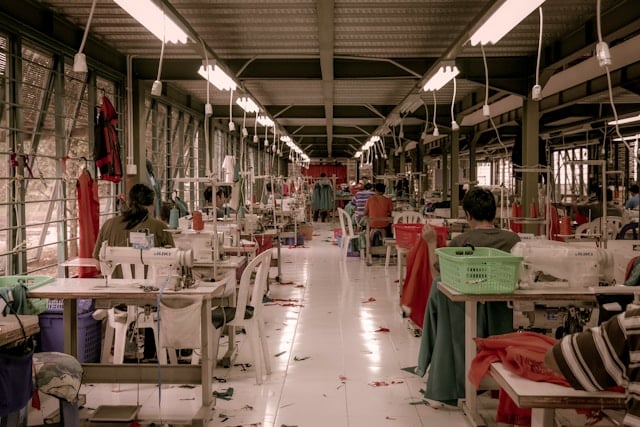How to Build a Community-Driven Brand in the UK Sustainable Fashion Industry?

In the vibrant and competitive world of fashion, brands are constantly striving to stand out and redefine their identity. One approach that’s gaining momentum in the industry is the concept of a community-driven brand. It’s not just about selling products anymore; it’s about creating a community of consumers who buy into the brand’s values and contribute to its mission. This is particularly relevant in the area of sustainable fashion, where consumers are increasingly aware of the social and environmental impact of their purchases. In this article, we’ll delve into how you can build a community-driven brand in the UK sustainable fashion industry.
Creating a Sustainable Brand Image
Understanding the importance of a sustainable brand image is essential to create a solid foundation for your community-driven brand. To earn consumers’ trust and loyalty, brands must demonstrate commitment to sustainable practices in every facet of their operations. This includes production, packaging, transportation, and even marketing efforts.
A découvrir également : What Are the Best Conversion Rate Optimization Strategies for Small UK E-commerce Sites?
Establishing a sustainable brand image begins with a comprehensive understanding of your brand’s environmental footprint. This involves evaluating the materials used, production processes, and overall product lifecycle. Once this is assessed, you can strive to implement sustainable practices such as using eco-friendly materials, reducing waste, or offsetting carbon emissions.
Transparency is also key in building a credible sustainable brand image. Consumers need to know your brand’s commitment to sustainability is more than just surface level. Communicating your brand’s sustainable efforts in a clear, compelling way is as important as implementing them.
A lire aussi : How to Prepare UK Businesses for the Post-Brexit Data Regulation Landscape?
Developing Relevant and Engaging Content
A major part of building a community-driven brand in the sustainable fashion industry is through content. Content that’s relevant, engaging and aligned with your brand values can help create a loyal community of consumers.
Consumers are not just passive receivers of content; they’re active participants in the brand’s story. Therefore, content should not only inform consumers about your sustainable practices but also inspire and motivate them to become part of the brand’s mission. This could entail sharing behind-the-scenes footage of your production process, highlighting the stories of individuals involved in the supply chain, or even providing tips on how consumers can live more sustainably.
Furthermore, the content should serve as a platform for dialogue. Encourage consumers to share their thoughts, feedback and ideas. This can be facilitated through social media, blogs, or forums. Not only does this help to foster a sense of community, it can also provide valuable insights for your business.
Capitalising on Social Media
Social media plays a significant role in shaping the fashion industry. It’s a powerful tool for brands to connect with consumers, share their story, and build a community.
In the context of sustainable fashion, social media can be used to educate and engage consumers about the importance of sustainability. This can be achieved by sharing informative content, sparking discussions on relevant topics, or showcasing the brand’s sustainable efforts.
User-generated content (UGC) is another effective way to foster community. Encourage consumers to share their own experiences, ideas, or photos related to your brand or sustainability. Not only does this help to create a sense of belonging, it also promotes the brand in an authentic and relatable way.
Partnering with Like-Minded Organisations
Collaborating with like-minded organisations can greatly enhance your brand’s credibility and reach. This could be charities, NGOs, or other businesses that share your commitment to sustainability.
Such partnerships can take various forms. You could co-create a product line, launch a joint campaign, or organise events together. The key is to find a partner whose values align with yours, and who can bring something unique to the table.
Not only do these partnerships increase your brand’s visibility, they also demonstrate your commitment to making a positive impact beyond your business.
Encouraging Customer Advocacy
Lastly, fostering customer advocacy is a powerful way to build a community-driven brand. Happy customers who believe in your brand’s mission can be your biggest advocates. They can spread the word about your brand, attract new customers, and contribute to the community.
To encourage advocacy, you need to provide an exceptional customer experience. This involves delivering high-quality, sustainable products, offering excellent customer service, and acknowledging and rewarding customer loyalty.
Moreover, give customers a platform to share their positive experiences. This could be through testimonials, reviews, or social media posts. Recognise and appreciate their support, and they’re likely to become even more engaged with your brand.
Activating Community Support through Events and Initiatives
Activating community support is another crucial aspect of crafting a community-driven sustainable fashion brand. This involves hosting events and initiatives that resonate with your brand values and vision. These could range from sustainability workshops, fashion shows highlighting your eco-friendly clothing lines, to clean-up drives that emphasise the importance of reducing waste.
In the digital age, virtual events have also become a popular solution. Webinars, online workshops, and live-stream sessions provide an opportunity for brands to engage with consumers, regardless of their geographical location. These platforms allow for live interaction, which can be instrumental in fostering a sense of community.
By hosting these events, fashion brands can encourage their community members to actively participate in their sustainability initiatives. This not only helps to strengthen the brand community, but it also reinforces the brand’s commitment to sustainability.
When planning these initiatives, it’s important to remember the core values of your brand. These events and initiatives need to align with your brand’s mission and should serve to educate your consumers about the importance of sustainability in the fashion industry. This will help you to go beyond merely selling products and allow your brand to establish a deeper connection with its consumers, thus paving the way for a long-lasting contribution to the fight against fast fashion.
In Conclusion: Building a Sustainable Community-Driven Brand
In the current climate, building a community-driven brand in the UK sustainable fashion industry requires more than just selling eco-friendly products. It is about fostering a community that not only buys into your brand’s values but also contributes to its mission.
A sustainable community-driven brand is built on the foundation of a strong sustainable brand image. This involves demonstrating a commitment to sustainability in every aspect of your operations, from production to packaging. Being transparent about your brand’s sustainable practices and developing relevant and engaging content are critical aspects of this process.
Social media is a powerful tool in this endeavour, allowing brands to connect with consumers, share their story, and foster a sense of community. Meanwhile, partnering with like-minded organisations can enhance your brand’s credibility and reach, and customer advocacy can help to spread the word about your brand. Finally, activating community support through various events and initiatives can further strengthen the brand community and emphasise the brand’s commitment to sustainability.
In conclusion, building a community-driven brand in the sustainable fashion industry is no longer a contribution; it’s a necessity. With consumers becoming increasingly aware of the social and environmental impact of their purchases, it’s crucial for brands to step up and take responsibility. After all, in the battle against fast fashion, every little bit helps. And every brand community that celebrates support and love for insightful and sustainable choices makes a difference.
